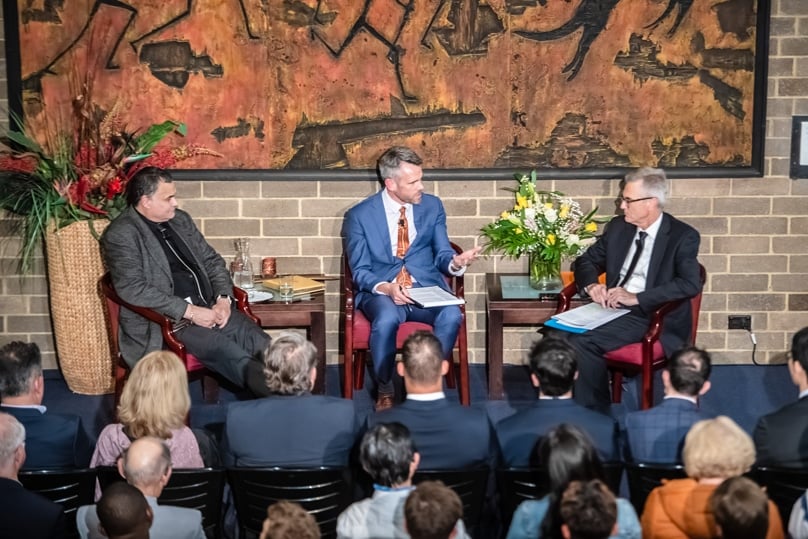
Whether or not the Voice to Parliament referendum passes on 14 October, the need is urgent to end entrenched disadvantage among Australia’s Indigenous people, agreed leading academics in the annual Warrane Lecture.
This year taking the UNSW college’s podium on 26 September were Associate Professor Sean Brennan, director of the Indigenous Legal Issues Project at the Gilbert and Tobin Centre of Public Law at UNSW, and Dr Anthony Dillon, postdoctoral fellow, Indigenous Thriving Program at the Australian Catholic University.
Representing opposing views on the need for a Voice to Parliament, the two spoke on Indigenous affairs in the context of the referendum and reasons for their Yes or No vote, before taking questions in a discussion moderated by college dean Alex Perrottet.
Dr Dillon, who identifies as part-Aboriginal, said he felt he and his relatives already felt they had opportunities to make their views known.
He did not see how a Voice to Parliament would make a difference, or how one representative body could speak for all of the country’s diverse Indigenous peoples and views.
He also took issue with the double-barrelled nature of the proposal, being about Constitutional recognition and a representative body.
However, he agreed that action needed to be taken to close the gap between the disadvantage experienced by many Aboriginal and Torres Strait and Islander people and most Australians.
If the referendum fails, it will not be a simple victory for the No side, Dr Dillon said.
“I’m not saying vote No and things should stay the same. I’m saying, vote No and there’s a hell of a lot of work that has to be done and very differently to how it has been done,” he added.
He said he is deeply concerned that while there are some “pockets of improvement” in the lives and opportunities of Aboriginal and Torres Strait Islander people, in other areas they are going backwards.
“One of the reasons why I believe we are not seeing a net gain is I think there is much too much emphasis on defining Indigenous Australians as being a vastly different species to non-Indigenous Australians and I don’t think that’s helpful. All it does is create jobs for gatekeepers,” he said.
“If I was to be in charge of Indigenous affairs in this country after the referendum, whether it was Yes or No, I would say we need to start with our programs on the assumption that non-Indigenous and Indigenous have far more in common than what is different between them, and they have the same fundamental needs.
“Certainly for the Indigenous population those needs are not being met to the same degree they are in the non-Indigenous.”
Professor Brennan served as part of a pro-bono legal team offering support throughout the process of regional dialogues, which lead to the First Nations National Constitutional Convention at Uluru in May 2017.
After outlining the history of the Voice proposal, he said it was a “simple, powerful, practical” idea reached by Indigenous leaders themselves when tasked by the Federal Government and opposition of the time to deliberate on what meaningful constitutional recognition would look like.
“It is a practical improvement to our system of government, compatible with the existing parliamentary democracy,” he said.
“The Voice proposal found a way to national consensus among Aboriginal and Torres Strait Islander peoples, and a solution to the question of what constitutional reconciliation should look like.
“It took multi-partisan commitment to recognising in our highest law, Aboriginal and Torres Strait Islander people and their societies, which have occupied these lands and waters for up to 65,000 years, and coupled it with making a sensible improvement to our system of representative and responsible government.”
Professor Brennan said the Voice is needed to correct a “structural flaw” present in our democracy which doesn’t provide a political lever for the country’s Indigenous people, spread out as they are in “very thin” numbers across 151 electorates, to influence the laws and policies affecting them.
“For 122 years our Constitution has contained a racist power,” he said.
